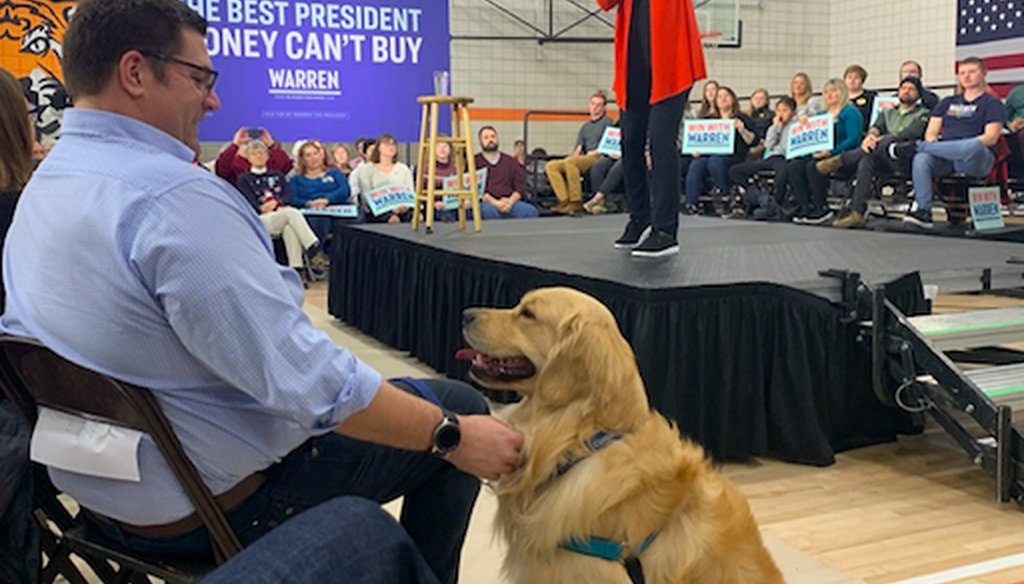Stand up for the facts!
Our only agenda is to publish the truth so you can be an informed participant in democracy.
We need your help.
I would like to contribute

Andrew Warren and Bailey Warren in the crowd of Elizabeth Warren's town hall in Davenport, IA (Tina Dyakon/PolitiFact)
DAVENPORT, Iowa — Sen. Elizabeth Warren, D-Mass., called for "big structural change" to help average Americans, rather than the richest and most powerful, in a town hall at a middle school in this Mississippi River city.
"If we want a country that doesn’t just work for the rich and the powerful … we aren’t going to be able to fix this with a nibble here and a little change there," she told the crowd of about 400 in the gym of Sudlow Intermediate School. "It’s going to take big structural change, and I’ve got a plan for that. In fact, I have a lot of plans for that."
Before Warren spoke, audience members were given raffle tickets to ask questions. When a field organizer called out the winning numbers, the winners were instructed to shout "persist" — a word Warren once famously appropriated from Republicans who were seeking to shut down her comments on the floor.
One woman fought back tears as she asked a question about how Warren would help her child who has learning disabilities. Warren embraced the mother before answering that she would add a wealth tax that would generate more money for education.
Asked about President Donald Trump’s impeachment trial, Warren said the administration has taken corruption to "new depths."
"Just remember right in the heart of (Trump’s impeachment) is an ambassador who bought his seat for $1 million contribution to Trump’s inauguration committee," she told the crowd. That was a reference to Gordon Sondland, the U.S. ambassador to the European Union and a key House witness during the impeachment inquiry. Although Sondland preferred other candidates to Trump in the 2016 election, he donated about $1 million to Trump’s inaugural committee and was nominated for his post by Trump in 2018.
PolitiFact is traveling through Iowa this week fact-checking statements made by Democratic caucus candidates. We’ve already fact-checked events of former Vice President Joe Biden, Sen. Bernie Sanders and Andrew Yang.
RELATED: Stump speech analyzers for Pete Buttigieg, Amy Klobuchar, Bernie Sanders Elizabeth Warren and Joe Biden.
After Warren’s town hall, we decided to fact-check her statements about marijuana arrests, gun background checks, the size of the 2017 Women’s March and her own college costs.
After Trump was inaugurated, "the next day the biggest protest march in the history of the world occurred."
It appears to have been the biggest one-day protest in the United States, but not for the entire world.
Professors Erica Chenoweth, then with the University of Denver, and Jeremy Pressman, of the University of Connecticut, concluded the Women’s March of Jan. 21, 2017, was "likely the largest single-day demonstration in recorded U.S. history."
Using publicly reported estimates of the scattered march locations and the number of participants involved in each, they determined that between 3.3 million and 5.2 million people participated.
Chenoweth, who now teaches at Harvard, said she can’t confirm that it was the biggest single-day protest in world history. In India, for instance, news reports earlier this month indicated that a quarter billion people went on strike against the government.
"That is surely a record, if true, but strike numbers are often impossible to confirm," she said.
In 2003, the BBC reported that between 6 million and 10 million people in over 60 countries participated in anti-war protests in Europe during the course of a weekend, with many protests falling on the Saturday. Estimates varied widely.
Warren said that when she lived in Texas, she attended a "commuter college that cost $50 a semester."
Warren is correct that her costs were low at the University of Houston.
Warren graduated from the University of Houston in 1970, according to a copy of her CV. University records show that tuition for Texas residents taking a full course load while Warren was enrolled was $50, although additional fees brought the total cost of attending the school up to about $100 a semester.
"I took on a popular Republican senator and beat him. I am the only person in this race who has beaten an incumbent Republican any time in the past 30 years."
This echoes a line from the January Democratic debate when she and Sanders sparred over the meaning of "at any time in the past 30 years."
Sanders defeated an incumbent Republican in 1990. Warren beat Republican Sen. Scott Brown in 2012. Given the timing of the election, Sanders’ victory was about 10 months shy of Warren’s cutoff for 30 years.
African Americans are "somewhere between three and four times more likely to be arrested for (marijuana) use."
Warren is accurately citing a credible report. The underlying data is at least a decade old, addressing a period before the wide-scale decriminalization of marijuana.
A 2013 report by the American Civil Liberties Union said that "a black person is 3.73 times more likely to be arrested for marijuana possession than a white person, even though blacks and whites use marijuana at similar rates. Such racial disparities in marijuana possession arrests exist in all regions of the country, in counties large and small, urban and rural, wealthy and poor, and with large and small black populations."
The report found that between 2001 and 2010, there were over 8 million marijuana arrests in the United States, 88% of which were for possession.
"36 million Americans couldn’t afford to have a prescription filled last year."
We previously rated this statement True.
Researchers for the Commonwealth Fund in 2018 estimated that 37 million non-elderly adults went without filling a prescription because they could not afford it. That’s almost 1 in 5 of the U.S. population. Having insurance coverage, the researchers note, doesn’t guarantee you’ll afford medication.
"We live in an America where more than 90% of Americans want to see us do a couple sensible things around guns. They want us to do sensible background checks, they want us to get weapons of war off our streets, more than 90%."
Many polls back up Warren’s assertion about public support for background checks, but support is lower for banning assault weapons.
When we looked at polling on the topic last September, we found a Fox News poll with 90% support for background checks on all gun buyers, including for gun shows and private sales. A Washington Post/ABC News poll found similar results.
Support is generally lower for banning assault weapons. We looked at five polls following the mass shootings in El Paso and Dayton that showed support for banning assault weapons ranged from 56% to 70%.
"In the early 2000s, mortgages had become so complex they had a one in five chance of costing a family their home."
Complex mortgages, mainly subprime and adjustable rate mortgages, grew in the first half of the decade and accounted for a huge share of defaults.
A 2007 study of home loans in Massachusetts by the Federal Reserve Bank of Boston found that "homeownerships that begin with a subprime purchase mortgage end up in foreclosure almost 20 percent of the time." That was just for Massachusetts, but Chris Herbert, managing director at the Harvard Joint Center for Housing Studies, said that was "in line with the rest of the country."
A separate analysis from the Federal Reserve Board of Chicago found that default rates exceeded 35% for subprime loans made in 2006. And a major federal report on the foreclosure crisis noted that adjustable-rate mortgages accounted for over half of foreclosure starts in 2008.
Our Sources
Washington Post, This is what we learned by counting the women’s marches, 2017, Feb. 7, 2017
BBC, Millions join global anti-war protests, Feb. 17, 2003
CNN, Cities jammed in worldwide protest of war in Iraq, Feb. 16, 2003
Guardian, Iraq war 10 years on: mass protest that defined a generation, Feb. 15, 2003
Atlantic, The Exhausting Work of Tallying America's Largest Protest, Jan. 23, 2017
TIME, Viewpoint: Why Was the Biggest Protest in World History Ignored? Feb. 15, 2013
Gallup, Analyzing Surveys on Banning Assault Weapons, Nov. 14, 2019
Statement from the U.S. Sen. Elizabeth Warren campaign, Jan. 26, 2020
See links in story for additional sources












































